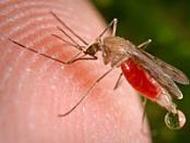VOA标准英语10月-Aid Group Says Free Testing, Treatment Essential(在线收听)
 The Doctors Without Borders, called MSF, humanitarian group says new advances in medicine make it ever more possible to combat malaria, one of the world's deadliest diseases. But it says these new methods will not succeed if their cost is passed on to the patient.
The Doctors Without Borders, called MSF, humanitarian group says new advances in medicine make it ever more possible to combat malaria, one of the world's deadliest diseases. But it says these new methods will not succeed if their cost is passed on to the patient.The group issued a report based on programs in three African countries, Mali, Chad and Sierra Leone.
 |
| Malaria is spread by mosquitoes |
Malaria kills an estimated one million people every year, mostly in Africa. Yet it is easily treated using new, rapid diagnostic kits, that allow treatment to begin immediately, and a combination of new drugs.
The report says the number of children receiving treatment in Mali tripled, and child deaths from malaria in Sierra Leone were halved when the treatment was free.
But MSF Advisor Seco Gerard says these techniques are expensive, especially for people in rural areas where malaria predominates. As a result many do not seek treatment.
Humanitarian groups usually provide treatment for free. But Gerard says it should be a policy for all providers.
"There are several African countries that have changed their health financing policy and where health care now does not require patients to pay," said Seco Gerard. "So we would hope that this kind of approach would be extended."
Malaria is caused by a parasite that is transmitted to humans by mosquito bites. It can be prevented through the use of mosquito nets treated with insect repellant.
Gerard agrees prevention should be part of the program to combat malaria and says her group also works in this area.
"Nevertheless, there are still some people that are going to be infected, a lot of children that will be sick," she said. "And if those children do not get access quickly to the treatment they need, a big part of them are going to die."
A network of 100 institutions and governments last week launched at the United Nations the Roll Back Malaria campaign. The campaign aims to virtually eliminate malaria deaths in seven years at a cost of more than $5 billion per year.
Gerard praised the effort, but said some of these funds should be used to make treatment free.
"If we continue in very poor countries to ask the patients to pay for the malaria care that the people need, those objectives unfortunately will not be reached," said Seco Gerard.
Experts agree, but note that this requires mechanisms and political commitment to ensure that funding continues and the medicines reach people in remote areas.